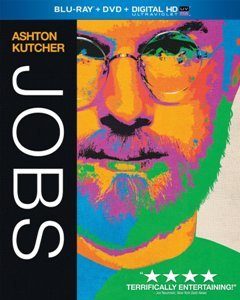- Joined
- May 9, 2003
- Messages
- 3,103
Jobs downloads its app to Blu-ray with an edition that’s as lightweight as both the movie and the latest iPad. The movie itself is a superficial overview of the life of Steve Jobs, making some cursory and obvious points along the way of showing a kind of “greatest hits” in the evolution of Apple Computers. Some of the performances along the way have good moments, particularly Dermot Mulroney and Lukas Haas. But the lead performance by Ashton Kutcher is sadly lacking, and the direction by Joshua Michael Stern is shockingly inept. The new Blu-ray presents the movie with solid picture and sound, along with a skimpy array of extras and one of the most unintentionally revealing commentaries ever presented on disc.

Studio: Universal
Distributed By: N/A
Video Resolution and Encode: 1080P/VC-1
Aspect Ratio: 2.35:1
Audio: English 5.1 DTS-HDMA
Subtitles: English SDH, Spanish, French
Rating: PG-13
Run Time: 2 Hrs. 9 Min.
Package Includes: Blu-ray, DVD, Digital Copy, UltraViolet
Disc Type: BD50 (dual layer)
Region: ABC
Release Date: 11/26/2013
MSRP: $34.98
The Production Rating: 1/5
Video Rating: 4.5/5 3D Rating: NA
Audio Rating: 4/5
Special Features Rating: 1.5/5
Overall Rating: 1.5/5
Reviewed By: Kevin EK
Support HTF when you buy this title:
